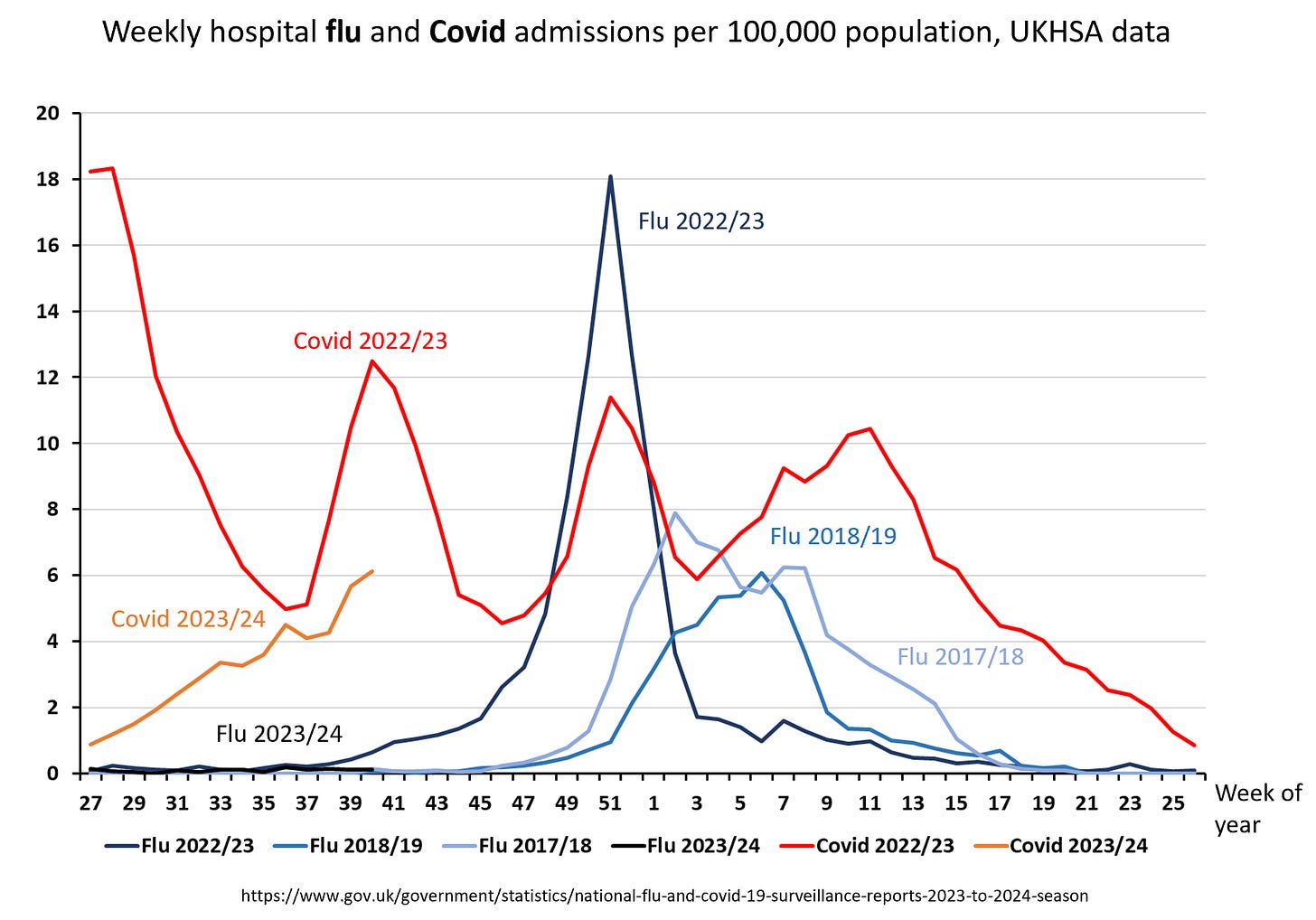Covid is not "just a regular winter bug"
Three points against a recent BBC article framing Covid as "just a regular winter bug"
The BBC recently published an article where they framed Covid as just a “regular winter bug”. The article claimed “there is plenty of evidence to suggest the virus is on its way to becoming just another respiratory bug to contend with, alongside flu and others…”. As evidence, it cited fewer hospital admissions with Covid this year than last year, and a recent UKHSA report that estimate that flu deaths exceeded Covid deaths in the winter of 2022/23.
There are three main problems with this framing: 1) flu is not just a “regular winter bug”; 2) Covid is still year round rather than a “winter bug”; 3) Covid is more likely than flu (or other winter bugs) to have damaging long term impacts such as Long Covid or elevated risks of longer term health problems such as heart attack, stroke, or diabetes.
Flu is not just a bug
You often hear flu lumped together with colds, as if they are of equal severity. Instead, before Covid, flu was, as Prof Michael Fuhrer put it, “by far the worst winter bug”. Winter flu seasons are a major cause of excess deaths in the UK, a major cause of winter NHS stresses and have adverse wider societal impacts. We have spent millions of pounds over the years expanding and improving the winter flu vaccination campaign - including to children - to reduce the burden of flu.
Claims that Covid is now on a par with flu, even if it were true, should not result in relief, but in concern as another serious disease adds to the burdens of an existing one.
Covid is not a winter bug
A recent UKHSA report compared modelled excess deaths from flu and Covid over the winter of 2022/23 and estimated 14,500 deaths from flu and 10,300 from Covid. Prof Michael Fuhrer did a good thread on the report here, but I will make two quick observations.
Firstly, as we can see from this plot of hospital flu admissions per 100,000 population, we had an unusually large flu season last winter, likely because it was the first proper flu season since before the pandemic and so population immunity was reduced after a few years of absence. This would also have led, unfortunately, to more flu deaths than in a more normal winter flu season. This year so far, there have been hardly any flu admissions and the data is tracking previous pre-pandemic seasons.
Secondly, flu is highly seasonal, with a single yearly spike in winter between December and February. Comparing flu deaths with covid deaths during just flu season misses out one key thing: Covid is not yet seasonal.
As can be seen in the chart below, Covid hospital admissions in 2022/2023 exhibited many peaks, only reducing significantly from Spring 2023. So far this 2023/2024 year, Covid admissions started climbing in August and are still climbing. We don’t yet know how many Covid peaks we’ll see over the coming year, but it certainly doesn’t look anything like flu in its timing or scale. Perhaps Covid will become confined to winter one day, but it isn’t yet.
This means that firstly it isn’t yet a winter bug, and secondly, that over a whole year its burden on people’s health and the NHS remains significant even if individual Covid waves are smaller than they once were.
Long Covid and post-Covid conditions
Finally, hospitalisations and deaths are not the only measure of severity. Many viruses, including flu, can result in elevated risks of complications such as heart problems or long term symptoms such as fatigue. However, the long term burden of Covid is significantly worse, partly because individually it is more likely to cause long term problems than flu, and partly because simply many more people are infected with Covid each year.
The most recent population wide estimate from the ONS Infection Survey in March 2023 (see chart above), was that almost 2 million people were reporting symptoms lasting longer than 12 weeks, and of those 361,000 said it impacted their daily a lot. That’s hundreds of thousands of people not being able to live their lives fully, with impacts such as not being able to work or study full time. Vaccination and previous infection have significantly reduced the chance of developing Long Covid but not to zero - high numbers of infections should not be treated lightly.
Covid simply is not a “regular winter bug”.








I gave up on social media because 'discussions' dealt in binary terms - the idea was totally correct or totally wrong. Christina's writings get back to the evidence based and nuanced discussions I grew up with. Thank you for doing the hard work to simplify complex data for a wider audience
Thank you Christina for your continued messages on this important subject. I read the BBC article and was horrified by the minimising tone and misrepresentation of the statistics. You have been a go-to source of information for me during the last couple of years, along with your Independent Sage colleagues. It is much appreciated.